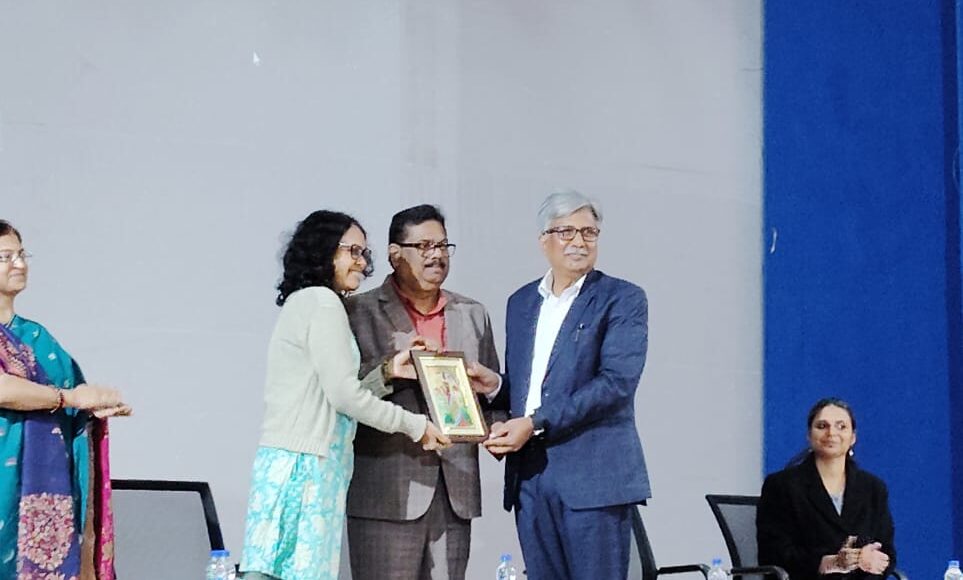Two-day regional conference on ‘Gender and Marginalization in Mid-Eastern India: Experiences from Jharkhand, Chhattisgarh, and Bihar’
Ranchi: The two-day regional conference on ‘Gender and Marginalization in Mid-Eastern India: Experiences from Jharkhand, Chhattisgarh, and Bihar’ concluded on Saturday at the auditorium of Dr. Shyama Prasad Mukherjee University, Ranchi. The conference was organized under the joint aegis of Dr. Shyama Prasad Mukherjee University, Ranchi, the Indian Association for Women’s Studies (IAWS), and Guru Nanak College, Dhanbad. The event witnessed the participation of researchers, scholars, academicians, and social workers from across the country and abroad.
Presiding over the closing ceremony, Prof. (Dr.) Tapan Kumar Shandilya, Vice-Chancellor of DSPMU, Ranchi, highlighted the dual-edged impact of industrialization and urbanization. While these have charted new pathways for development, they have simultaneously exacerbated issues of displacement and marginalization. He asserted that development models which displace local communities are inherently unsustainable. Emphasizing the necessity of inclusive and holistic growth policies, Prof. Shandilya stressed the preservation of the cultural and environmental heritage of local communities during the developmental process. He underscored that tribal communities endure not only the trauma of displacement but also a profound disruption of their cultural roots. To address gender and tribal inequalities effectively, he advocated for a balanced approach that harmonizes traditional roles with modern needs.
The Chief Guest, Dr. Bimal Prasad Singh, Vice-Chancellor of Sido Kanhu Murmu University, Dumka, emphasized that understanding the challenges of tribal and rural communities is pivotal to devising meaningful solutions. He observed that displacement and migration adversely impact the developmental trajectory of children, and neglecting their health exacerbates social and economic issues. Dr. Singh called for heightened awareness campaigns at both administrative and societal levels to combat systemic violence and discrimination against marginalized communities.
Special Guest Dr. Vibha Pandey, Deputy Director of the Higher and Technical Education Department, Government of Jharkhand, discussed inequalities in health and education. She noted that regional and gender disparities in these sectors hinder the development of marginalized groups. Highlighting the ramifications of displacement, Dr. Pandey observed an alarming rise in school dropout rates among children from migrant families. She proposed portable education and healthcare services for migrant communities and argued that violence against women and tribal groups can be eradicated not merely through legal measures but by transforming societal mindsets.
Dr. Namita Singh, Registrar of Dr. Shyama Prasad Mukherjee University, Ranchi, underlined the significance of the conference, describing it as a crucial step toward addressing gender disparities and marginalization. She emphasized the urgent need to enhance the living standards and safeguard the rights of marginalized communities amid ongoing industrialization and urbanization. Stressing the importance of sustainable and inclusive development policies, Dr. Singh urged researchers, educators, and experts to contribute solutions to these intricate issues through their knowledge and scholarship. She also expressed gratitude to the organizing institutions and participants, describing the conference as an exemplary platform for knowledge exchange.
IAWS President Dr. Kalpana Karunakaran shed light on the interconnections between gender and tribal identity. She advocated for a comprehensive approach to understanding and empowering these identities. Dr. Karunakaran highlighted that disparities in access to health and education services are rooted not only in gender but also in regional and economic inequalities. She emphasized the dual responsibility of government and society in addressing these disparities.
IAWS General Secretary Dr. Maya John praised the quality and thematic contributions of the research papers presented at the conference. She noted the critical role of research in exposing societal challenges and proposing practical solutions. Dr. John particularly highlighted the hardships faced by children in displacement scenarios, stressing the need for robust governmental policies to safeguard their rights and provide equitable access to education and healthcare.
The event’s proceedings were moderated by Dr. Shuchi Santosh Barwar, while the vote of thanks was proposed by the regional coordinator of the conference, Shama Sonali.
This conference served as a significant initiative to spotlight the challenges of gender disparities and marginalization in Eastern-Central India, particularly in states such as Jharkhand, Chhattisgarh, and Bihar. It contributed to understanding the predicaments of marginalized communities and devising effective strategies to address these issues.
Over 50 research papers were presented during the conference, encompassing a wide array of topics. These papers offered not only academic insights but also practical solutions to pressing societal issues.

